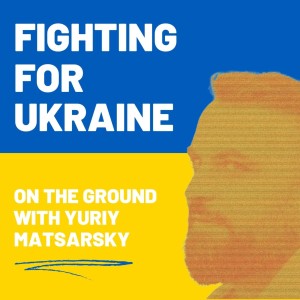
June 18th 2024
Yuriy reflects on the grim reality of war, where death becomes an all-too-familiar presence. He discusses the heavy emotional toll of losing friends and colleagues, both through warfare and other tragic circumstances, highlighting the insufficiency of psychological defenses built for war when faced with non-combat deaths.
https://yuriymatsarsky.substack.com/p/unleashing-azov-why-one-of-ukraines
https://yuriymatsarsky.substack.com/p/chronicle-of-kharkiv-during-the-war
You can email Yuriy, ask him questions or simply send him a message of support: fightingtherussianbeast@gmail.com
You can help Yuriy and his family by donating to his GoFundMe: https://www.gofundme.com/f/help-yuriys-family
Yuriy’s Podbean Patron sign-up to give once or regularly: https://patron.podbean.com/yuriy
Buy Yuriy a coffee here: https://bmc.link/yuriymat
TRANSCRIPT: (Apple Podcasts & Podbean app users can enjoy accurate closed captions)
It is June 18.
We have become accustomed to people dying in war. It is very clinical, but there is nothing you can do about it when every day, hundreds of people die from bombs sharing mine explosions and missile strikes. You get used to it. You just know that by the end of the month, several of your friends will have died, and by the end of a year, several dozen. By the end of the war, it'll be hundreds and hundreds. This is a kind of forced fatalism that is unavoidable in war. It quickly becomes part of each of us.
We have indeed become used to the fact that war constantly takes away friends and relatives. This has become the grim norm of war time. We are so accustomed to it that we forget that death can come not only from bullets and shrapnel but also from cancer, heart attacks and accidents. And when such a non-war death suddenly intrudes into our difficult pain field lives, the usual psychological safeguards fail. We are turned to a different kind of pain. They are entirely focused on war, and so they don't help.
A few weeks ago, my senior colleague, who had greatly helped me in my profession, died of a heart attack right at his workplace. He was an excellent specialist who knew everything or almost everything about Ukrainian politics. I used to invite him to my show every month and when we would discuss for a couple of hours more what we didn't have time to cover on air. After I joined the Army, I saw him only once- we met by chance in Kyiv when I came last year to receive an award from Zelensky.
His death was a very heavy blow for me and it wasn't the last one. My colleague in journalism who is much younger than me, but from whom I have learned a lot. Was hospitalized with cancer in a stage that leaves almost no hope for recovery. I don't know, maybe it is somehow connected, but a few months ago, her boyfriend died in the war and she has significantly declined since then.
Death has become routine, we get used to it, but nonetheless, it can still shock us. Because of all this news, I fell ill and for several weeks, could barely think clearly. Today I have prepared two links for you. The first is a new text about how Russian propaganda has painted Azov as Nazis, and the second is a video from my native Kharkiv. Read, watch and leave comments if you like it.
No comments yet. Be the first to say something!